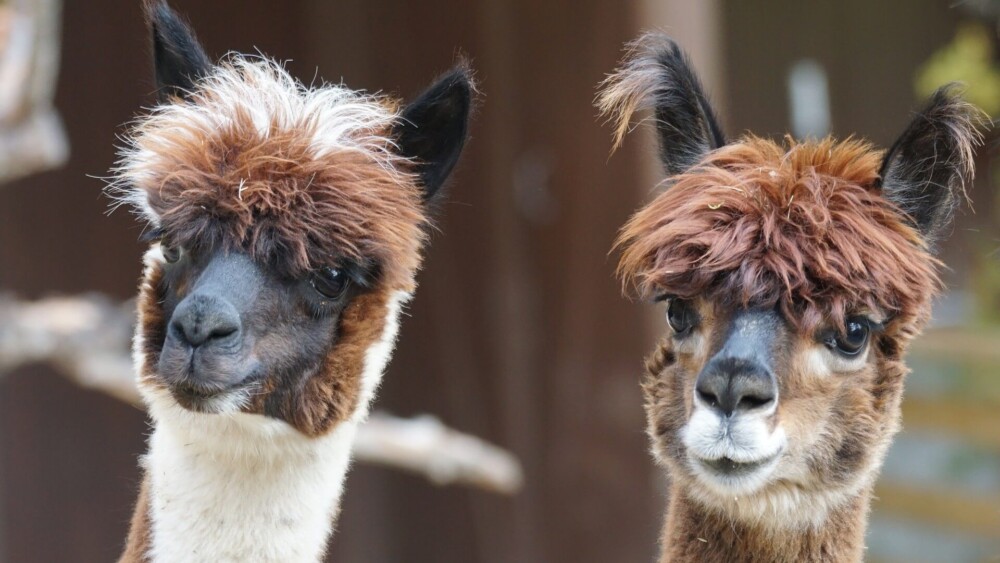Alpacas are inherently social animals with an intricate, matriarchal herd structure. They graze together, warn each other of danger, and sleep in the safety of numbers.
On a farm, alpacas thrive best when this herd structure is replicated with at least three other alpacas. Some alpaca owners, however, can’t fulfill this requirement. In some areas, like mine, it’s challenging to find alpacas available for sale.
Because of the conflicting information found online about companion animals for alpacas, I interviewed alpaca farmer Sylvia Showers, owner of Yellow Star Ranch, to get you the most reliable information. Showers has bred and showed alpacas for over twenty years in Lumby, British Columbia.
Do alpacas need a companion? Alpacas require companionship from other animals. Without it, they become agitated, and some owners have reported alpacas that died of loneliness. Never keep only one alpaca. Keep a minimum of three alpacas or one or two alpacas with companion animals.
The best companion animals for alpacas are llamas, miniature horses, donkeys, sheep, goats, poultry, and Livestock Guardian Dogs. These animals can offer a harmonious relationship to your alpaca with proper precautions.
Other “companion” animals such as cattle, horses above 14 hands, and pet dogs are usually too risky around alpacas.
Realistically consider the risks of a diverse pasture for both companion animals and alpacas. These include safety factors and shared illnesses or parasites.
Alpacas Die of Loneliness
Even though they come across as independent creatures, alpacas form strong bonds. They’re tight herd animals and particularly prone to stress. One alpaca remains alert to predators while the others sleep, and they rotate these “shifts.”
“Alpacas are very smart, sensitive, and feel most comfortable in a flock,” Showers says. “Therefore, I would never recommend having just one alpaca. It would make them feel very lonely and vulnerable.”
Without the stability of companions, one single alpaca will grow agitated and anxious, especially if he is sleep-deprived. The enormous stress this creates can cause ulcers that become fatal if left untreated.
Alpaca owners often describe their animals as “stoic.” Because they often appear healthy, owners may not notice the signs of illness until it’s too late. You can prevent this by careful observation and by providing companionship to your alpaca.
How to Raise Alpacas: A Beginner’s Guide
Rules for Providing Alpaca Companion Animals
Companion animals are any kind of domesticated animal that provides fellowship to a human or another animal. Some animals can fulfill your alpaca’s social needs or create a more dynamic herd.
Showers’ advice is this: “Alpacas can be kept with other animals, but first and foremost, their needs when it comes to food and supplementation have to be considered. Parasites from different species have to be part of the consideration.”
Here are a few quick tips for success:
1. Always match sexes
Intact male alpacas (called machos) can try to mate or act aggressively with female animals of other species. Likewise, don’t keep female alpacas (hembras) with studs like donkeys, llamas, or horses. Keeping female and castrated male companion animals with geldings and female alpacas will avoid unwanted mating and aggression.
2. Ensure there’s enough space
Alpacas mixed with other animals will require more space to ensure more security and happiness. If you have a large pasture, you can keep alpacas and companion animals together successfully.
3. Feed your alpacas and other livestock separately
Since grains and some livestock feeds are toxic to alpacas, always separate your animals for feeding time.
4. Know the individual
Don’t keep an animal known for aggression with an alpaca or an aggressive alpaca with other animals. Older alpacas can also be at risk when they share a paddock with younger and energetic animals, such as horses or donkeys.
Select animals carefully for docile personalities and similar ages. This ensures a smoother coexistence.
5. Ask questions first
Asking the current owner questions about the companion animal helps you flesh out the individual’s temperament and habits. This further enables you to establish compatibility.
Has the animal ever been with alpacas or llamas? How does she interact with other species? Is he a bully? Make a list of questions to ask – before you buy.
6. Integrate slowly
Always integrate new herd mates gradually. First, keep the new animal in an adjacent pen for seven to fourteen days. This minimizes the spread of disease and allows the animal to become familiar with its new surroundings.
Then let the animal and your alpaca interact in small, supervised increments until you’re able to combine them in one paddock safely.
7. Evaluate the worst-case scenario
Considering the worst that could happen will help you determine what is best for your alpaca and the companion animal. It could either affirm compatibility or give you the foresight to decide against a particular animal.
8. Consider pasture rotation instead
Some animals are better left with a fence to separate them rather than sharing a pasture. They can still interact with each other through a fence without safety or health risks.
10 Companion Animals for Alpacas
There are many animals that could be used as a companion, but some are much better than others. Let’s take a look at the best pasture companions for alpacas:
| Companion Animal | Overall Rating | Pros | Cons |
| Llamas | Best | Llamas provide protection, have similar needs, will bond | None |
| Miniature Horses | Very Good | Form strong bonds, inexpensive compared to large breeds, can be kept on pasture | Can sometimes injure alpacas, salmonella risk |
| Sheep | Very Good | Typically docile, compatible, easy to keep, can be kept on pasture | Horned sheep can hurt alpacas, shared diseases |
| Goats | Good | Easy to maintain, inexpensive, usually docile | Horned goats can injure alpacas, shared diseases, copper exposure |
| Horses | Worst, Use Caution | Form strong bonds, provide protection | Can easily injure or kill alpacas by accident, salmonella risk, more expensive |
| Donkeys | Good, Varies | Guarding instincts, symbiotic relationship on pasture | Can be aggressive, different fencing |
| Cattle | Worst | None | Shared parasites, high risk of injury to alpacas |
| Poultry | Very Good | Provide stimulation, reduce parasites, easy to keep, inexpensive | Feed additives toxic to alpacas, feces can cause illness |
| Pet Dogs | Worst, Use Caution | Some alpacas like dogs | High risk of injury to alpacas can be stressful |
| Livestock Guardian Dogs (LGD) | Best | Provide the best protection, form strong bonds | High training, expensive |
1. Llamas: Incredible Protectors
Llamas are usually hardy animals that thrive on pasture. They also have the same basic nutritional requirements that alpacas do. Llamas are intelligent, friendly animals that you can quickly train.
“Llamas and Alpacas can live together without problems, as both are from the same family,” says Showers. But, “Generally, their temperament is very different.”
While alpacas are known as more affectionate, llamas tend to be more standoffish and distant. Alpacas are also more likely to flee if they feel threatened. Llamas, however, are praised for their excellent guarding ability that stems from a natural disdain for canines. They’ll protect their turf – and your alpaca.
Even though llamas are great protectors, they can only defend themselves and other animals against one dog or coyote. They’re still vulnerable against a pack of coyotes, wolves, or larger predators like bears. If you have an issue with predators, try having a few llamas or Livestock Guardian Dogs.
Altogether, llamas will bond to alpacas, and they make the best companions.
2. Miniature Horses: Big Personalities
Miniature horses are similar to alpacas in size. They also deliver a weaker kick than larger breeds. Both alpacas and horses use communal dung piles, making cleanup more convenient.
I know someone who keeps her three alpacas in a pasture with twenty miniature horses. The key is the pasture’s size. It’s large enough that the alpacas and horses can coexist happily without constant intermingling. They don’t have to interact if they don’t want to.
Miniature horses with a gentle temperament can strongly bond with an alpaca. They’re also sweet, mild animals that are relatively easy to keep and train.
“We used to have a rescue miniature horse living with the alpacas for a while. It depends mostly on the temperament of the horse. Also, feeding can be difficult as their needs are different. Our alpacas always have access to hay, as generally, they don’t overeat. Horses and donkeys should have their food rationed most of the time.”
As Showers alludes to, miniature horses are particularly prone to obesity. Because of this, they’re the healthiest when rotated between a pasture and dry paddock.
Another risk is that horses can carry salmonella without symptoms showing, which alpacas are susceptible to. Even so, it’s relatively uncommon.
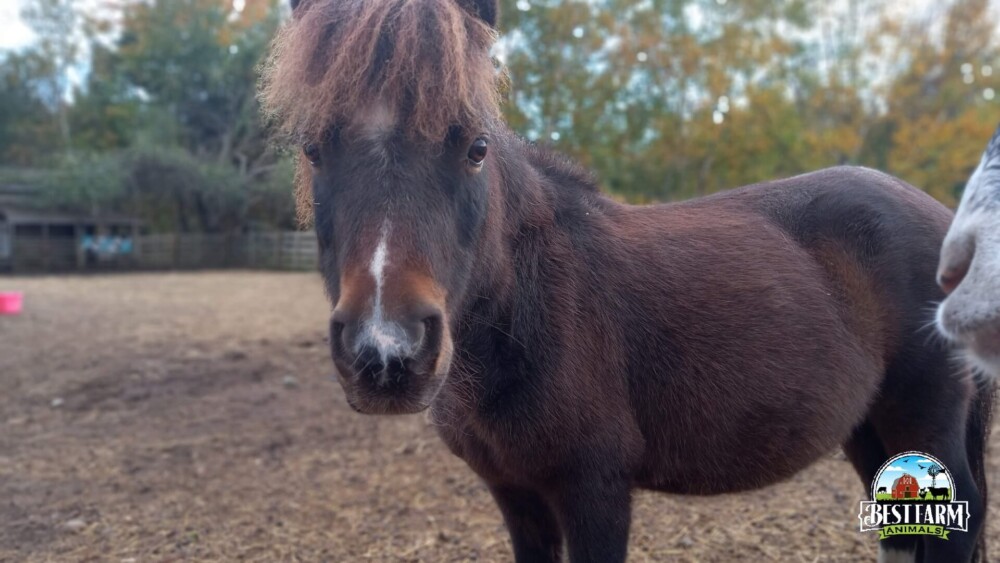
3. Goats: Friendly Companions
Goats are beloved for their friendly attitudes and adaptability. They can readily accept alpacas as part of their herd. To top it off, goats are easy keepers and easily acquired almost anywhere.
“Goats like to ‘headbutt’ and push other animals out of the way,” she warns. “Alpacas don’t understand this ‘language.’” Make sure your goats can’t injure your alpacas by headbutting, especially if they have horns. You can avoid this by purchasing polled or disbudded goats.
Another concern? Alpacas are sensitive to the same copper that goats require. Over time, this can be fatal. You’ll need to be extremely careful your alpacas can’t access feed or loose minerals containing copper designed explicitly for goats.
We avoid this issue with our horses and sheep by giving our goats copper bolus supplements instead of loose minerals. We also corral them into another pen to further reduce the risk of the other animals ingesting copper by mistake.
How to Raise Goats: Full Guide for Beginners
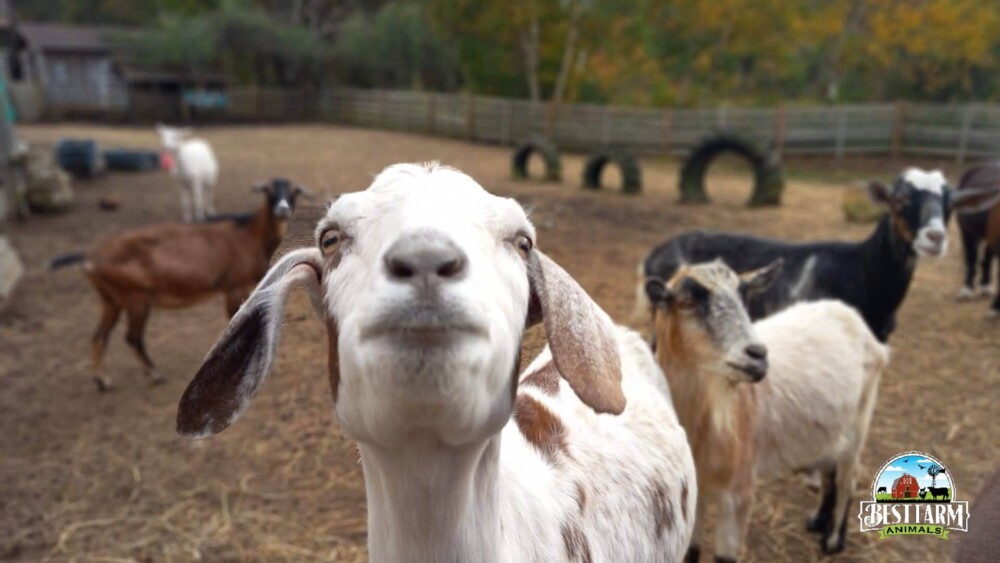
4. Sheep: Gentle Companions
Sheep are typically docile and easy to care for. They aren’t difficult to come by, and they’re relatively inexpensive. Sheep also share the same type of fencing as alpacas.
“Sheep are more suitable in my opinion, as they are usually not quite as aggressive [as goats] when it comes to feeding,” Showers says.
Ewes or castrated male sheep make the best companions for alpacas. Sheep are often gentle animals and will look to a larger animal like an alpaca for comfort.
Avoid keeping rams and alpacas together. Rams are notoriously aggressive and almost guaranteed to injure other animals like alpacas.
Alpacas are susceptible to some of the same diseases sheep and goats carry. These include Johne’s disease, Soremouth, Q fever, and others. Sheep and goats both leave a trail of feces wherever they go, which can expose grazing alpacas to parasites and diseases.
5. Donkeys: Intelligent Guardians
Donkeys are incredibly clever animals increasingly used as guardians for livestock. While they have a bad reputation for being stubborn, many donkeys are quite affectionate.
Unlike other equines, donkeys are browsers. They enjoy a variety of bushes, berries, and other plants, but they seldom eat grass. Since alpacas are grazers that ignore these plants, donkeys can help maintain your pasture.
“I have seen donkeys living peacefully with alpacas. It all depends mostly on the donkeys. Alpacas are vulnerable and could get injured quite badly by a donkey by getting kicked or bitten. The same goes for horses,” she adds.
“Generally, I would say donkeys are a better match than horses. Also, horses and donkeys need different fencing than alpacas. Alpacas need fencing to keep predators out, and generally, an alpaca doesn’t challenge fences, where horses and donkeys like to rub on fences, push on it or try to lean over.”
Some donkeys, however, are territorial. They have been known for shaking other animals between their teeth. Usually, though, these cases involve hormonal and aggressive jacks (uncastrated males).
Donkeys raised with animals such as alpacas, goats, and sheep, will be more likely to accept your alpaca and coexist tremendously. Be certain to choose jennies or geldings that are praised for a friendly attitude.
How Much Does a Donkey Cost to Buy and Keep In the USA?
6. Horses: Loyal But Reactive
Horses form fierce, loyal bonds to other horses, animals, and humans. They’re intuitive and intelligent animals, and their disposition may seem perfectly matched to alpacas. Additionally, horses can provide alpacas with some measure of protection.
As such, some alpaca owners choose to keep their animals with horses sized 14.5 hands and up. While this can work, it’s potentially dangerous to the alpaca.
Any experienced horse owner or avid equestrian will tell you that even “calm” horses spook easily by stressful, unexpected, or unfamiliar stimuli. As prey animals, instinct usually drives their actions. Horses can injure or even kill alpacas entirely by accident with one powerful kick.
Most horses also enjoy galloping around the paddock. Mine frequently do this at full speed. If you’ve ever seen the spectacular sight, you’d understand how terrifying it is to alpacas. This alone can cause undue stress to the animals.
At such a speed, it’s also challenging for horses to stop on a dime. They can unintentionally trample an alpaca or hurt themselves trying to avoid the alpaca.
Economically, it makes more sense to have two alpacas instead of a companion horse. While one alpaca can cost on average between $400-$1,500, most horses range from $700-$6,000 and up. Alpacas cost less annually to keep, as well.
Due to the risks involved, it’s usually best to keep horses and alpacas separated by a fence so they can enjoy interacting safely.
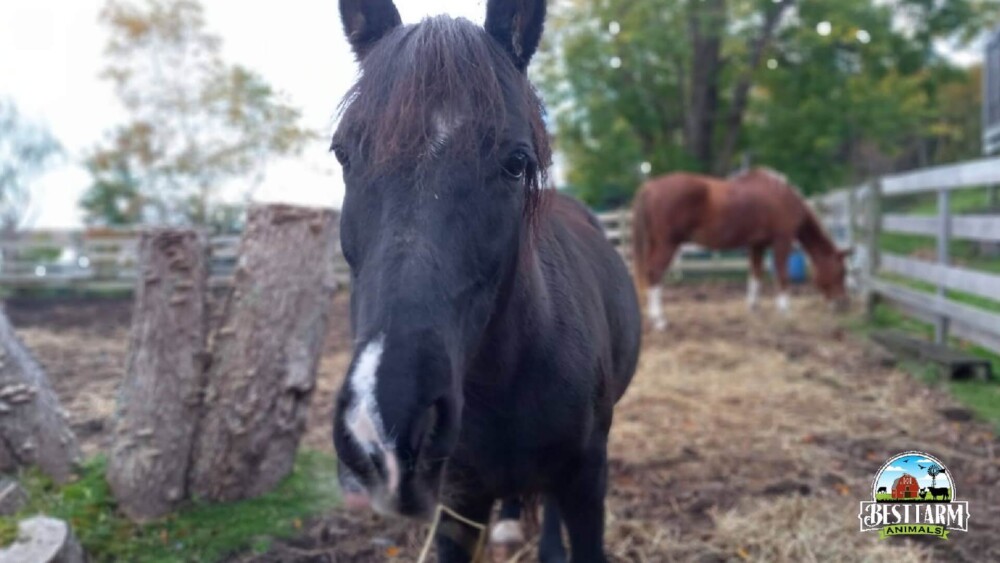
7. Livestock Guardian Dogs: Excellent
Livestock Guardian Dogs have been specially refined for centuries to protect animals. They’re strong and determined enough to chase and kill any predator they deem as a threat to their charges. These include coyotes, wolves, cougars, and even bears.
Despite this, Livestock Guardian Dogs are incredibly gentle and form fierce bonds with the animals they guard, including alpacas.
If predators are a threat to your alpacas, an LGD such as a Great Pyrenees, Maremma, Akbash, or Anatolian Shepherd may be the best option. Keep in mind that you’ll need to train an LGD extensively before plopping a puppy in with your livestock.
I am currently getting an LGD for our animals. The best practice is to give your Livestock Guardian a quiet, safe space to adjust to his new surroundings for a few days. Aspen, our one-year-old Great Pyrenees, will have an adjacent pen all to himself so he can see the animals without being overwhelmed.
After that, follow the principle for introducing any animal to another. Gradually let them grow to trust each other. Trust is fundamental and this step cannot be skipped.
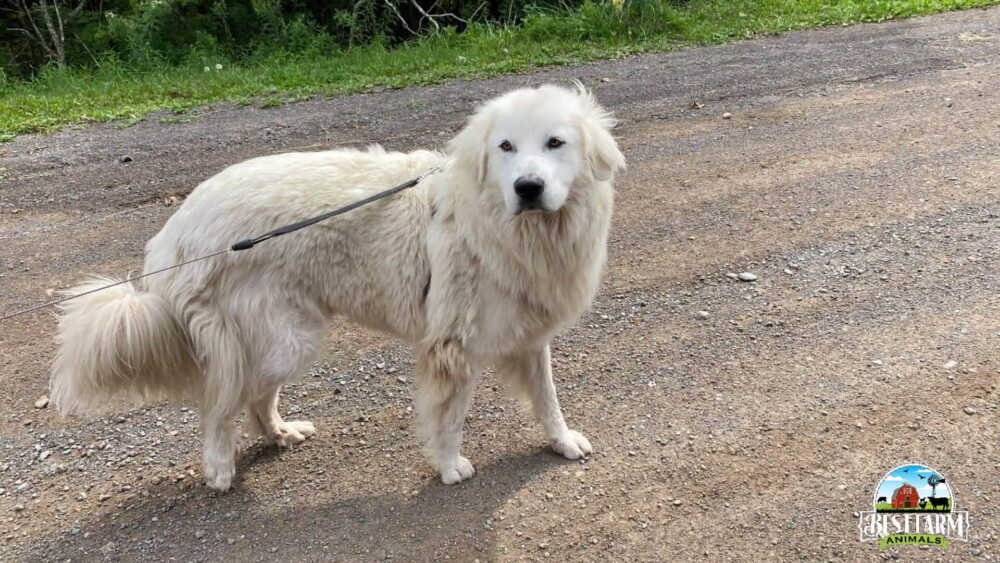
8. Poultry: Fun Entertainment
We all know how amusing chickens and ducks are. Well, alpacas think so, too.
Chickens can offer rich stimulation to your alpaca. Birds also help naturally desensitize prey animals like alpacas by exposing them to their crazy antics.
“In my opinion, poultry is a good choice. Poultry scan pastures for bugs like ticks, scratch through manure piles, and eliminate parasites. The alpacas, therefore, don’t pick them up again.” She also points out that “Poultry will be somewhat protected from smaller predators by the alpacas.”
That said, they can’t replace the company of another camelid. If you already have a few alpacas, chickens can offer supplementary entertainment. They also create a tremendous symbiotic relationship by mutually benefiting each other.
chicken feed often contains additives toxic to alpacas, so never toss chicken feed anywhere near your livestock. Also, always ensure your birds don’t share sleeping quarters with alpacas. This is an easy way to transmit diseases through chicken feces.
9. Cattle: Too Risky
Cattle are friendly and playful – but a little too dangerous for alpacas.
Never keep a steer with an alpaca. Steers are much larger than alpacas and more dangerous and aggressive than cows. Alpacas are unable to defend themselves against them. A steer could also crush an alpaca in an attempt to breed.
One or two docile female cows can happily graze with a handful of alpacas, but always make sure there are more alpacas than cows. This reduces the risk of injury to alpacas.
You should also separate cows with calves from alpacas. New mothers are incredibly protective and may try to attack your alpaca.
Showers also cautions, “Cattle have different supplement and fencing needs, and parasites can be an issue. Also cattle (just like sheep and goats) leave their “droppings” everywhere, whereas alpacas are very clean and use a ‘community pile.'”
10. Pet Dogs: Use Caution
Pet dogs can be both a nuisance and a threat to alpacas. Excitable dogs may jump or bark excessively, startling and overwhelming an alpaca. Dogs that are unfamiliar with camelids may become too excited or aggressive and start nipping. Some dogs even intentionally attack alpacas.
On the other hand, how do alpacas feel about dogs? “Dogs are generally well accepted by alpacas if introduced properly,” Showers says. “We have Livestock Guardian Dogs living with our alpacas, but they are also very accepting of cats and pet dogs.”
Bear in mind that even pet dogs used to alpacas shouldn’t be kept outdoors with them. A well-trained, adaptable dog with a lovely disposition may safely interact with your alpaca. Try letting them sniff noses through the fence, so they become familiar and comfortable with each other first.
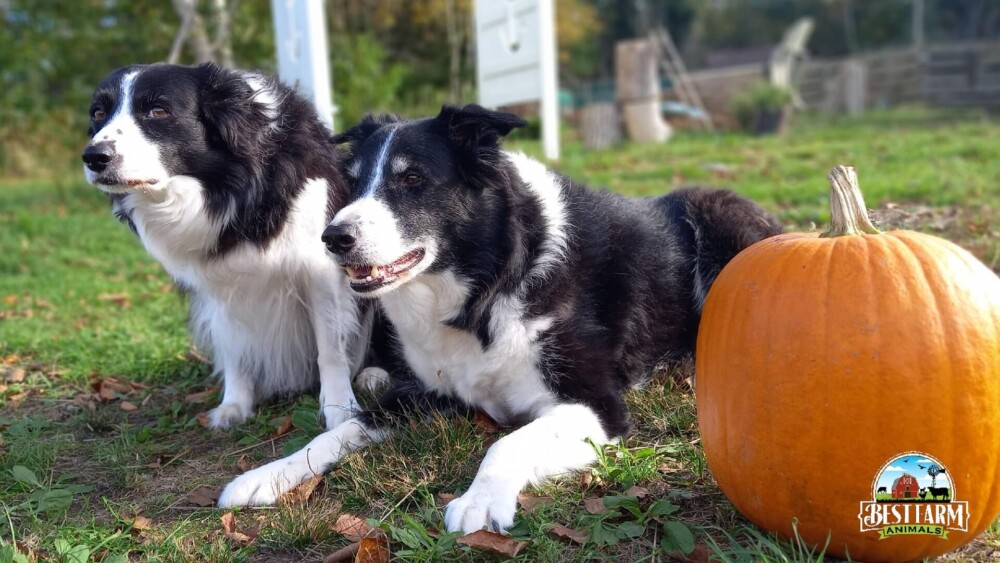
Conclusion
Showers closed the interview with these lovely words: “Alpacas are brilliant, very gentle animals. They are very accepting of new environments, people, and animals if introduced properly. They need some time to adjust but have a great memory.”
“Alpacas are the happiest in a group (flock). The more, the merrier. It makes them feel safe and comfortable. Alpacas are very trainable and are fairly low maintenance. Once a person connects with an alpaca, there is no turning back. They are a huge part of our family, and we wouldn’t want to be without them.”
My Favorite Alpaca Resources and Supplies
Heavy Duty Water Tank that I use for all of my animals. They don’t crack or break in the cold easily and don’t wear out from the sun in the summer. These are the #1 most important supply I have for my animals.
This Water De-Icer is another critical supply that I use for every waterer. I’ve tried the heated buckets, the fancier water defrosters and pretty much everything else on the market. But these work the best. Hands down, especially when we hit -20 below!
Hoof Trimmers that don’t rust or go dull as fast as other brands. Some of the more expensive options out there have dulled much faster. These will last well if you don’t leave them in the weather.
Organic Feed for when you need a treat. Alpacas are great for grazing and don’t need commercial food, but when you want to give them something nice, this is a great option.
Electric Coat Trimmer that will cut the thicker fur of Alpacas and help them cool off in the hotter summer days. These are a great cheaper option that don’t cost $400+ that the really nice ones cost.
Winter weather can lead to overeating, but this slow feeder helps to slow down your alpacas so they don’t overeat. I haven’t tried this one, but it’s on my list.

